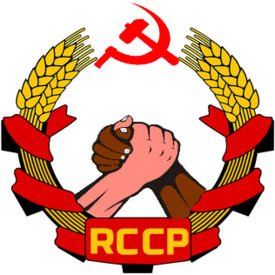Revolutionary Commonwealth Communist Party
| Revolutionary Commonwealth Communist Party | |
|---|---|
 | |
| Chairperson | Jim Avakian |
| Founded | May 1, 1973 |
| Headquarters | Nashville |
| Newspaper | Serve the People |
| Student wing | Revolutionary Student Brigade |
| Youth wing | Revolutionary Youth Brigade |
| Membership | unknown, estimated 10,000 to 15,000 |
| Ideology |
Communism Shining Path Thought |
| Political position |
|
| International affiliation | ICMMO |
| Official colors | Red |
| National Committee |
0 / 600 |
| Central Congress |
0 / 1,580 |
The Revolutionary Commonwealth Communist Party, abbreviated RCCP, often referred to as RevComs are a clandestine revolutionary communist party active in the United Commonwealth, following the ideas of Maoism and the Communist Party of the Andes. It has been founded in 1973 and is to date the most prominent and active group within the Continental New Left, a movement that has been heavily influenced by the Chairman of the RCCP, Jim Avakian. The RCCP is explicitly an anti-UC government party and does not take part in elections, calling for a total boycott and "a second proletarian revolution in North America", against what in their view has degenerated into a state of "party barons" and revisionists. As one of the earliest proponents of gay marriage, full abortion rights in the UC and its criticism of the system of the ethnic republics within the UC, the RCCP has been deeply influencial within the student movement and political counter culture in the United Commonwealth after Great War II.
History
1970s
The exact beginnings of the RevComs are only loosely recorded, due to the clandestine nature of the organization. Several informations about the origins of the party come from secondary sources or the party itself. According to its own sources, the RCCP was founded on May Day 1973 in Nashville, Tennessee at the Polytechnical University of Tennessee. One of the founders and the first (and to date only) Chairman was professor of economics Jim Avakian along with around 20 people, including both students and staff of the university. However it is unlikely that the RCCP was the first group to follow a communist, but not landonist line that opposed that of the Continentalist Party. In fact, an increase in left anarchist activities in Chicago and the coastal urban centers has been reported since the end of the second Great War with the emergence of an increasingly rebellious and questioning youth culture. The Maoist groups, so called "M-Groups" began to form at several universities and in the Rust belt, inspired by the Andean Revolution to begin a revolutionary war against what was felt to be an increasingly isolated ruling party. Taking this into account, the founding of the RCCP might be linked to the forming of the Continental Democratic Movement (CDM) and the Students for a Progressive Society (SPS) of which only little primary sources exist, but an overlap between CDM or SPS members and the RCCP founders is recorded. In its early days the RCCP has centered its activities in and around the city of Nashville, Tennessee where posters and pamphlets were discovered calling for revolution and protest against the current Gardner administration which they described as "the new beaurocratic capitalists" and "quasi-derzhavist autocrats", calling for a replacement of the representative system with that of the mass line as practiced in People's Republic of China and the United People's Committees. In 1975 a coalition of the RCCP, SPS, CDM and former members of the Revolutionary Front of the Continentalist Party occupied the campus of the Polytechnical University in Nashville for 72 days in what became known as the Nashville College siege". Contacts to the Sierran Revolutionary Continental Army have been reportedly established in 1979, in particular to the black nationalist faction, whith both organizations signing a friendship treaty and declaring each other sister-organizations in their respective countries. By 1979 the RCCP has also established presence in Ohio and Louisiana, with local chapters and mergers with local groups being established.